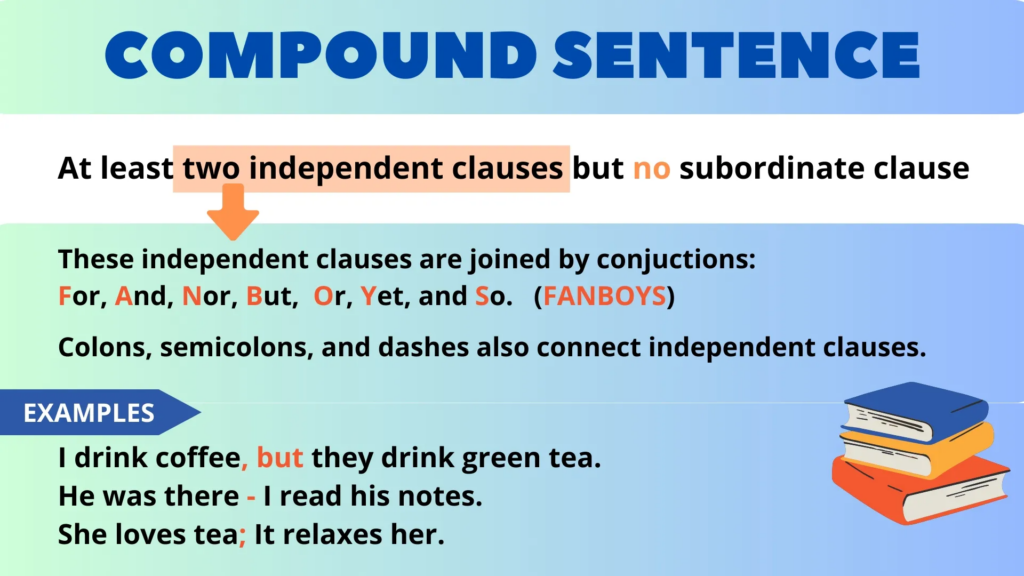
Compound Sentence Made Absolutely Easy: 5 Key Points for Flawless Writing
We live in a world where we converse in our daily lives, talk with people around us, or even write messages to convey what we feel to others. With our messages, we write statements, questions, and even points of view – but do you ever consider each sentence you write and ponder if they are correct or not?
In writing, we are more expressive of our thoughts. We can write anything and whatever we want to convey our ideas about something. To express our thoughts in writing, we use appropriate punctuations. With correct punctuation marks, we can create different types of sentences – a compound sentence to be specific.
What is a compound sentence?
In our article about complex sentences in English, we mentioned that there are four types of sentences namely: declarative, complex sentence, compound sentence, and interrogative sentence. We learned a lot on how to form them. However, in this article, we will focus more on forming a compound sentence and share with you some hacks to enhance your writing skills and make it nice and appropriate.
A compound sentence is a type of sentence that consists of two or more independent clauses joined together by proper punctuations such as the comma and the semi-colon. They are also formed by having a coordinating conjunction to connect the ideas between the independent clauses. Writing a compound sentence correctly can make the meaning of a sentence informative and meaningful.
In writing a compound sentence, both clauses must be independent. It’s not like the complex sentence where it has one or more independent clauses and one dependent clause (or a clause that cannot stand alone). For example, the sentence “John plays tennis every morning and he goes to work after his game” has two independent clauses joined together by the conjunction “and.”
John plays tennis every morning. He goes to work after his game.
Both of the sentences are complete sentences and can stand alone. This expresses an independent clause, a clause or statement that can stand alone. To make it simpler, the independent clause is just a simple sentence with a subject and a predicate.

Key Points to Remember When Writing a Compound Sentence
To have a flawless and informative writing, we must adhere to some grammar rules concerning compound sentence. Below are some of the key points to remember when writing a compound sentence.
- Always use a coordinating conjunction when writing a compound sentence
Coordinating conjunctions are words that link other words and clauses in sentences. The three main coordinating conjunctions are but, and, and or. In addition, do not forget to use a comma before a coordinating conjunction that links the independent clauses.
Look at the examples below:
Mr. Potter attended the conference in Tokyo, and he gave an inspiring speech with the attendees.
I was not feeling well yesterday, but I still went to work.
Will Monica bring the documents today, or she will not come here?
Tip: You can easily identify a compound sentence with a coordinating conjunction. Just remember the acronym FANBOYS: for, and, nor, but, or, yet, so.
- We can also form a compound sentence without a coordinating conjunction, but by using a semi-colon (;) in between the two independent clauses
Examples:
There was a road accident near my house; the casualties were all women.
I like Aamir Khan’s movies; the “3 Idiots” is one of his best movies.
Jack found out about the criticisms; he seems to be bothered.
- Capitalize only the first letter of the first word in sentences without proper nouns or if they start with the pronoun “I”. If they contain proper nouns, follow the standard rule of capitalization in English.
I am not against policy amendments, but I strongly object the implementation of the new policy.
Please take good care of my children; I’ll get them when I come home.
Mr. Griffins taught Linguistics at the university, and his expertise is in Sociolinguistics.
- Conjunctive adverbs like however, meanwhile, anyway, likewise, otherwise, etc. can also be used in forming a compound sentence. Never forget to use a semi-colon before them.
The employee engagement program is helpful; however, not all employees are interested to participate.
Make sure to submit your report in my office on Friday; otherwise, you will have to send them to our new branch through a courier.
The flight is delayed for an hour; meanwhile, I kill time by listening to music.
- Take note that a compound sentences always has two independent clauses – both have a subject and a predicate.
Example:
My manager did not respond to my message, but she informed me about the presentation.
Subject: My manager
Predicate: did not respond to my message
Subject: She
Predicate: informed me about the presentation
Knowing the rules of writing a compound sentence can help us make our writing smooth. Using a compound sentence in our writing is helpful to avoid common sentence errors particularly the run-on sentence. The more we know how to write a compound sentence correctly, the better and more understandable our sentence is.


Test Yourself!
Make a compound sentence from the sentences below observing the correct punctuation and coordinating conjunctions.
- There are some books on the table. I don’t like reading one of them.
- We are going on a holiday this summer. We will go to Hawaii with my family.
- Monica was not able to attend the meeting. She still was able to catch up with the discussions.
- Please but the biscuits in the fridge if you are not going to eat them. Throw them in the trash bin.
- Do you always take the train to work? Do you come to work on foot?
- Our school administrator launched a new project. It was not approved by the board.
- On the weekend, we will have a picnic at the park. We will not push through with it if it rains.
- Watch your steps at the stairs. You will fall if you don’t do it.
- My friend’s wedding was so private. The guests were not satisfied with the food.
- I want to pay our email with a card. I think my card is locked.




